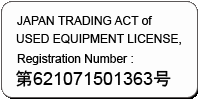NEWS : Komatsu increased prices in North America
Japan stocks soar on price hikes, soft yen and strong U.S. economy
60% of companies exceed analyst expectations as share buybacks also increase
TOKYO -- Japan's listed companies are riding strong financial results -- bolstered by price increases, the weak yen and the robust U.S. economy -- to historic high stock prices, with 60% of companies that have announced profit results for October to December exceeding analyst expectations.
Staffing services company Recruit Holdings' shares gained sharply in Tokyo on Tuesday, briefly reaching a high of 6,412 yen, up 9% from Friday's close and the highest level since January 2022.
Investors responded to the company's earnings forecast on Friday, which projected a record net profit of 354 billion yen ($2.3 billion) for the year ending March, up 31% on the year.
The company's forecast for the year exceeds the average projections of QUICK Consensus market analysts by about 10%. Recruit's domestic travel reservation sites are doing well, making up for a slump in the U.S. staffing business.
"Because the stock price had been suppressed due to concerns about a slowdown in the U.S. business, the reaction to the strong earnings forecast became inflated," said Keita Kubota, head of Japanese equities at Neuberger Berman.
The steady flow of earnings results continues to exceed expectations.
Of the 207 companies that are part of the Nikkei 500 Stock Average, have fiscal years ending in March and have announced results for the October-to-December period as of Thursday, 121, or 58.5%, announced a net profit for the quarter exceeding the analyst average forecast.
Investors first became bullish as companies focused on domestic demand fared better than expected. In the non-manufacturing industries that include retail and service, net profit forecasts for about 70% of the companies exceeded analyst expectations.
As real wages continue to decline, some have been concerned about the future of domestic consumption. However, several leading companies have been able to dispel concerns with their ability to raise prices and the overall strength of their products.
One example is furniture retailer Nitori Holdings, which posted a net profit exceeding analyst expectations by 6% when it announced consolidated financial results for the April-December period on Thursday.
The company is increasing profit margins by replacing products with more profitable ones to make up for the increase in costs caused by the softer yen. Its stock price on Friday briefly rose 9% from the previous day, hitting its highest point since November 2021.
Another factor increasing investor appetite is easing concerns about the future prospects of companies that rely on foreign demand. In addition to the effects of the weaker yen, U.S. operations performed well, resulting in earnings that exceeded analyst expectations.
Heavy equipment maker Komatsu, which has increased prices in North America, posted consolidated net profit for the April-December period exceeding analyst expectations by more than 4%. Construction demand is increasing in the U.S. on active infrastructure investment.
Investors are also sensing changes in companies' stances on shareholder returns. This earnings season, many companies are announcing dividend increases or share buybacks. The announced amount of share buybacks since the beginning of 2024 has surpassed 1.3 trillion yen, on pace to exceed the previous three years.
Department store operator Isetan Mitsukoshi Holdings announced on Feb. 2 that it had raised the full-year earnings forecast for the third time this fiscal year, as well as plans to increase dividends and conduct a share buyback. The stock price soared 7% the next trading day, and investment money has continued to flow in since.
Trading house Mitsubishi Corp., which announced a large-scale share buyback plan worth up to 500 billion yen, also rose 10% the day after the announcement, setting a new high since going public.
Companies do not usually announce share buybacks when stock prices are high because, from the perspective of management, it can dilute the stock's perceived affordability. Efforts to return profits to shareholders despite that point to a shift in mindset stemming from the Tokyo Stock Exchange's calls for companies to be more aware of capital costs and stock prices.
Some companies have been left behind amid the rise in stock prices. "Results overall are a mix of positive and negative," said Takamasa Ikeda, senior portfolio manager at GCI Asset Management.
Electronics maker Omron's business in China, which accounts for 20% to 30% of total sales, did not perform well, and its stock price went limit-down the day after results were announced.
資料:NIKKEI ASIA
2024-02-14 22:18:22
View All News






